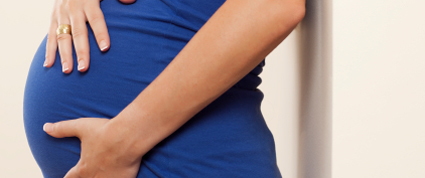
“Express delivery” can sometimes take on a new meaning for some expectant moms. If you’re pregnant, are you wondering if your labor will be speedy? Are you curious about whether a quick labor is unusual?
Labor is considered “fast” or “precipitous” when it lasts three hours or less, and this only happens in a small percentage of live births. Last year, the CDC reported that over 21,000 out of 945,180 live births involved rapid labor or express deliveries. This means 2.26 percent of these births were express deliveries—and that data is just from women who reported risk factors, procedures or some anomaly.
What causes fast labor?
If you are among the small percentage of moms who have a faster or shorter labor than most women, do you know what causes this? Is it possible to know ahead of time if your birthing process will be short or long?
Most published reports suggest that fast labor generally has a physical basis. According to Williams Obstetrics, causes include a particularly efficient uterus that contracts with unusual strength, and extremely compliant soft tissues inside the birth canal.
Possible physical and genetic risk factors:
- an above-average “pelvic outlet”
- a well-aligned pelvis, pubic bone and birth canal
- an unusually small baby
- a baby positioned extremely well to come out
- having a female relative who also experienced fast labors
Other causes of precipitous labor
Of course, premature labor also tends to be faster. And in those rare cases when labor is induced, it might cause over-stimulation of contractions—causing the labor to speed up too much.
Women who have previously experienced fast labor, may be at a higher risk for a fast birth with each new pregnancy. In such cases, it’s important to get to the birthing location as quickly as possible if the birth seems imminent. If you’re alone, you may need to call an ambulance.
Is quicker labor better?
Is a swifter labor better for you or your newborn? Not necessarily. Considering how demanding the birth process can be, a fast childbirth can be exceedingly challenging for your mind and body. On the other hand, a very slow, protracted labor can result in an exhausted mommy and baby.
Moms giving birth for the first time often report a longer labor process. Firstborns usually take their sweet time, and the birthing process can last about 16 hours or so. For women who have previously given birth, their labor times tend to be shorter. For second babies, the time-frame for active labor averages about five hours, and it typically doesn’t last longer than 12 hours.
What to do if symptoms point to a fast labor
A quick-moving labor can produce extreme fear in moms. It’s vital for the birthing mom to try to be calm for a better labor and delivery experience. If you have some of the signs pointing to a potentially fast labor, it might be worth a visit to the chiropractor. The chiropractor may be able to line up the spine and pelvis to adjust the pelvic outlet. He or she may also be able to lessen any constrictions in the uterus affecting the baby’s positioning.
Fast labor needs special handling
If you find yourself experiencing the rushes and waves of labor contractions in a fast labor, it’s important to stay in control of your fears. The biggest fear may be the fear of the unknown. Instead, focus on staying calm through the birthing process.
When a fast labor does happen, it comes with its own special issues that need to be handled with care. Some of these problems include having contractions that seem continuous. And, if you’re suddenly having no breaks between contractions, you might be among the small fraction of women who are in a rapidly progressing labor.
If this occurs, be sure to call your doctor, midwife or doula right away, as you might deliver before you can get to a birthing center or hospital. Your health professional can help guide you through this as smoothly as possible.
Handling challenging situations
Many expectant parents are unprepared for a sudden fast labor process. In fact, some who had originally planned to give birth in a hospital may suddenly find themselves having a natural birth at home.
At times, such fast births may be sensationalized in the media, and labeled as frightening emergency situations. For instance, you may recall the cliché of the woman in labor giving birth in a taxi cab because she didn’t get to the hospital in time. This scenario is rare and, luckily, has turned out well in most cases. Natural birthing has been around a long time -- long before the advent modern high-tech hospitals.
Moms who have experienced quickly moving labor have posted their stories online, and it appears that most of these births are filled with inspiring moments. Words and phrases such as: “gentle,” “spiritual,” and “where the mind and body were connected” were used by moms to describe what happened.
